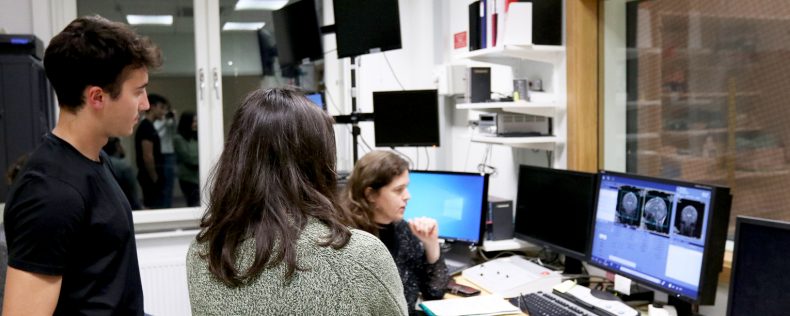Course Syllabus
 |

| Semester & Location: |
Spring 2024 - DIS Copenhagen |
| Type & Credits: |
Elective Course - 6 credits |
| Major Disciplines: |
Neuroscience, Psychology |
| Research Mentor: |
Dr. Julian Macoveanu (current students please use the Canvas Inbox) |
| Senior Research Manager: |
Jeanette Erbo Wern jwe@dis.dk |
| Research Director: |
Susana Dietrich - research@dis.dk |
| Academic Support: |
6-Credit Research Assistantship
The 6-Credit Research Assistantship (6RA) is an experiential learning opportunity promoting the development of research skills in an international, professional, research setting. As a Research Assistant, you perform research under the supervision of a Research Mentor (a lead scientist in the external research group). The mentor is able to offer both academic and professional advice. In addition to acquiring research experience, the goal is to develop a student/mentor relationship that benefits both the DIS student and Copenhagen-based research institutions.
Research Project Description
Psychiatry is undergoing a paradigm shift from symptom-based diagnostic evaluations and treatment to an increasing focus on biomarkers to aid diagnostics accuracy and prediction of prognosis. Bipolar disorder is a common mood disorder marked by recurrent depression and mania and is among the top ten most debilitating illnesses in the world. Current challenges are a poor diagnostic accuracy and limited insight into biomarkers that predict illness outcome. The current study will examine the volume of various brain structures in a large cohort of newly diagnosed patients with bipolar disorder using structural magnetic resonance imaging (MRI). The main goal of the study is to identify cortical and subcortical structures that can predict subsequent mood episodes in patients with bipolar disorder.
The structural MRI data has been processed using Freesurfer, a widely used software package in the field of neuroimaging, specifically designed for the analysis and processing of MRI data of the human brain. Developed by the Laboratory for Computational Neuroimaging at Harvard University, FreeSurfer is an open-source tool that provides a comprehensive suite of tools and algorithms for a range of brain image analysis tasks e.g., automatically segment brain MRI images into different anatomical regions, including gray matter, white matter, and cerebrospinal fluid. The statistical analysis will employ general linear models adjusting for relevant factors such as, age, sex, total brain volume.
Learning Objectives
- Perform literature searches and generate hypothesis
- Plan, conduct, and critically evaluate experimental data
- Actively participate in scientific discussions with a critical approach to the research
- Write a research paper and present experimental data in a professional way
- Learn ethical standards and academic integrity in a research process
- Experience the authenticity of research, including the unpredictabilities, the unexpected challenges, and unknowns that are a common part of conducting research
Research Assistantship Hours
Students will spend 180 hours directly engaged in research. You will arrange a schedule with your mentor which will allow you to complete an average of 20 hours of combined lab and theoretical work. Note: there may be peak times in the research process where all Research Assistant students are expected to spend a few more hours, and then possibly a few less another week – to reflect the individual research project and research process. Also, the total research hours may vary according to the research opportunity and expectation of your research mentor.
Lab Location
TBA
Research Mentor

Dr. Julian Macoveanu
Ph.D. (Medical Sciences (Neuroscience), Karolinska Institute, Sweden, 2006). Ph.D. Licentiate of Engineering (Computational Biology), University of Linköping, Sweden, 2005) MSc. (Biochemistry, Stockholm University, 2002). Postdoctoral Research Associate, Danish Research Center for Magnetic Resonance (DRCMR) Copenhagen University Hospital Hvidovre. With DIS since 2014.
Responsibilities and Expectations of the Research Mentor
Your research project will be part of a larger, ongoing research project at the research institution. Your mentor and/or co-mentors will guide you on methodology and techniques, advise as to ethical considerations, provide feedback throughout the research process, and help you find resources to conduct your research on-site. The RAship encourages a gradual transition toward independence as you gain more confidence in the lab, transforming your work into a more self-directed and self-motivated project under the mentor’s guidance and supervision. It is important, that the project reflect your work, as a 6RA student, not only your mentor’s contribution.
It is not expected that you pursue a project where you are able to obtain definitive publishable results. The project chosen and agreed upon between you and your mentor should be focused and designed to produce results within the DIS semester calendar. While it is not necessary for the results to be significant (in that the results find a solution to the problem or hypothesis proposed), arguably any results to the proposed question are significant to the next phase of a research project.
Responsibilities and Expectations of the Research Assistant
Specific expectations of you as a student is agreed upon with your mentor at the beginning of the semester. However, in general it requires that you:
- Spend an average of 20 hours per week carrying out the research project. You will need to arrange a schedule with your mentor which will allow you to complete the required hours performing a combination of theoretical and hands-on research at the external research institution.
- Arrange project check-in meetings with your research mentor and/or co-mentor(s) at mutually agreed upon times during the semester. Clear and continuous communication with your research mentor throughout the term is a necessary part of the research project and it is expected that you initiate these meetings.
- Submit assignments on time including a literature review, a outline of the research project, a final research paper and a oral presentation of the project as agreed on with your mentor.
As part of your theoretical focus, you are expected to read and write relevant scientific literature in relation to your research project and use your newly-gained knowledge to critically evaluate the research component, ask relevant questions, and actively participate in research discussions within the field. During the practical work, you are expected to actively engage by planning and performing your own experiments or data collection and carefully monitoring the conducted experiments and analyzing the collected data. You are expected/encouraged to critically evaluate possible issues if results do not go as expected and come up with ideas to modify or reflect on potential mistakes.
Overall, it is important to be enthusiastic about the project. Carrying out a research project is neither a straightforward nor predictable process as you are creating new (and at times unexpected) knowledge. This is part of what makes research exciting but also challenging!
Evaluation and Grading
During the research course, you are expected to fulfill various assignments. To be eligible for a passing grade in 6RA, all of the assignments must be completed. It will be your mentor that assess your work and assign your final grade.
Assignments and their weights are shown in the following table:
|
Participation* - Lab-based work and theoretical hours *10% of grade comprises attendance & active participation in the research orientation, research workshops and DIS Festival |
30% |
|
|
Literature Summary Review |
5% |
|
|
Outline of the Research Project: |
Written Project |
5% |
|
Oral Presentation of the Project |
5% |
|
|
Research Paper: |
Written Project |
45% |
|
Presentation at DIS Festival |
10% |
|
|
Total |
100% |
|
The literature summary review is an opportunity to seek out existing peer-reviewed articles and, in that way, enhance your scientific knowledge within the research area and kickstart your research project. In addition, it is essential that you have knowledge of previously produced research by the research institution with which you are working.
An outline of the research project will provide you with an overall research plan and help structure your research during the term. By creating an outline, you will be able to better comprehend the objective of your efforts. Your mentor will also be able to use the outline to assess areas in which your current knowledge and understanding may be lacking.
The research paper is the final product of your research assistantship. In the paper, you will explain your work throughout the term, including the methodologies you have used, the overall process, the project’s significance, and the contribution to the field of research in which you have engaged. Please note: this research paper is not produced with the intent of publishing, but if you put in the hours and effort it may end up being a publication.
For the oral presentation, you will present the research you have carried out throughout the semester in a recorded format, agreed upon with your mentor and approved by DIS. The presentation should have a logical and clear structure and provide relevant information on the background, methods, conclusions, and future perspectives of the presented work. The original data reported in the paper should be presented and discussed in a clear way.
Participation is a central part of laboratory-based research and the international study experience. To receive full credit, you are required to be present at all the scheduled research sessions in and outside of the lab and actively participate and engage in the experimental work (both practical and theoretical).
Of the final participation grade (30%), 20% is based on:
- Attendance and the level of preparation, planning, and conduction of the experimental research work at the research place as well as your level of self-directed and self-motivated research work
- Your overall contribution to research discussions with the research group in general, at journal clubs, and at project presentations
The remaining 10% is based on attendance, preparation, and active participation in the research orientation at the start of the term, required research workshops, and research symposium at the end-of-semester showcase.
At the DIS Festival you will present the research you have carried out throughout the semester in a format agreed on with your mentor and approved by DIS
Workshops
There will be several DIS workshops planned for research students during the semester. The content of the workshops is subject to change and may include overviews/introductions of skills your mentor will expect you to execute, as well as discussions on the goals of research and the ways in which research questions are culturally and historically-contingent. Workshop examples include, but are not limited to:
- Literature Search and Citation Skills
- Research Ethics
- Interpreting and Analyzing Data and the Significance of Results
- Communicating Research Findings (including poster production)
- Structure of Abstracts and Research Paper
There will be homework for the workshops.
Data
Note that many US colleges/universities require their students who are participating in research at home or abroad to acquire Institutional Review Board approval. Examples include:
- Research involving human subjects
- If the results of any research conducted during your semester with DIS involving human subjects are to be made public or published in the US
You are responsible for confirming whether home IRB-approval is required and, if so, for seeking the approval of your home schools IRB. In addition, all research conducted in Europe must adhere to GDPR regulations.
Before Arrival to Copenhagen
Once accepted as a Research Assistant, you will be connected with your mentor(s) via email. Please note some mentors may give you 10 – 15 hours of research literature to read before your term start.
Academic Regulations
Please make sure to read the Academic Regulations on the DIS website. There you will find regulations on:
Course Summary:
| Date | Details | Due |
|---|---|---|